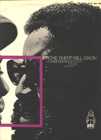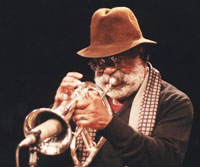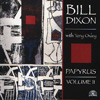|
BILL
DIXON: Consequences LP (BYG); Papyrus Volume II CD (w/Tony
Oxley) (SOUL NOTE)
 If
my copy hadn't apparently gotten so friendly with a previous
owner's cat, this would probably be a rather collectable
item: an original BYG pressing from 1968 of a split LP by
Archie Shepp and Bill Dixon. They don't play together, but
rather each contributes a side recorded with their own respective
bands. (This record was originally released in the USA,
to a similarly limited audience, by Savoy.) Shepp, even
in his more overt bluesman-thespian-francophile modes, is
always worth checking in with, especially when his band
includes John Tchicai, Ted Curson, Don Cherry, Ronnie Boykins,
and Sunny Murray, as it does here; together they do a more
'covert' post-bop kinda free thing. It's very good. However,
it is the Bill Dixon side that I've been playing over and
over again. Dixon, though active from then (1963) right
up until now, has only put out 10-15 records to everyone
else's 30-40, so there seems to be something important,
elusive, and arcane about his music. If
my copy hadn't apparently gotten so friendly with a previous
owner's cat, this would probably be a rather collectable
item: an original BYG pressing from 1968 of a split LP by
Archie Shepp and Bill Dixon. They don't play together, but
rather each contributes a side recorded with their own respective
bands. (This record was originally released in the USA,
to a similarly limited audience, by Savoy.) Shepp, even
in his more overt bluesman-thespian-francophile modes, is
always worth checking in with, especially when his band
includes John Tchicai, Ted Curson, Don Cherry, Ronnie Boykins,
and Sunny Murray, as it does here; together they do a more
'covert' post-bop kinda free thing. It's very good. However,
it is the Bill Dixon side that I've been playing over and
over again. Dixon, though active from then (1963) right
up until now, has only put out 10-15 records to everyone
else's 30-40, so there seems to be something important,
elusive, and arcane about his music.
There seems to
be, and in fact, there is. This early example contains two
pieces, "The 12th December" and "Winter Song,
1964." Cool Monk-ish ensemble themes, with a playful
swing bounce that immediately references the old tradition
of jazz. (In fact, the most 'avant-garde' thing about much
of the music is simply the murkiness of the recording, although
my wife described the band as being "out of tune,"
and that's pretty avant-garde too.) The drumming by Howard
McRae, who I don't believe I've heard from outside of this
recording, is a real treat to focus on in the jazz murk,
alternating between straight swing patterns and a kind of
herky-jerky tribal bossa nova rhythm…you can really hear
him taking chances back there. Again, the drums aren't recorded
that well, but it's pure charm, having that same on-the-fly
'garage jazz' feel that a lot of old Sun Ra recordings had.
In fact, early Arkestra
is the most pertinent point of comparison, not only for
the recording quality, but also for the slightly skewed
bouncing space-swing feel of the music, and the presence
of Ken McIntyre on oboe and Howard Johnson on baritone sax,
both instruments being prominent in Ra ensembles. McIntyre's
oboe solo on "The 12th December" really takes the song to
another joyful level with its winding leaping Dolphy-esque
snake-charmer lines, as does the boisterous shades-of-Pat
Patrick solo by Johnson, another name otherwise unknown
to me. (Please note: no lame joke about a hotel chain is
inserted here.)
Dixon's trumpet solo,
which occurs between the oboe and the baritone  sax
solos, is odd. He combines a lovely, languid post-Miles
'straight' feel with strange overtonal phrasing…but his
overtones aren't strictly 'outside', and he uses them quietly
and sparingly, as grace notes on traditional melodic phrasing.
I've listened to this track several times in the last 24
hours, and the second time I encountered this solo and really
listened carefully to it, I swear for 30-40 seconds it made
me wonder if Dixon just couldn't play that well, if he just
didn't have that strong of an embouchre, and, like Miles,
he knew how to make his limitations part of his aesthetic,
by playing idiosyncratic solos, but saving most of his energy
for his real talents, composing and band-leading. However,
just as I was formulating all of this, Dixon ended his solo
with a few lines of the languid, lovely and very correct-sounding
style I mentioned above. So go figure. I mean, it's not
like this side of this record wasn't alluringly mysterious
enough already...now I've got this particular trumpet solo
to deal with...better evade that whole issue by asking
the real question…which Bill Dixon recording should I get
next??? sax
solos, is odd. He combines a lovely, languid post-Miles
'straight' feel with strange overtonal phrasing…but his
overtones aren't strictly 'outside', and he uses them quietly
and sparingly, as grace notes on traditional melodic phrasing.
I've listened to this track several times in the last 24
hours, and the second time I encountered this solo and really
listened carefully to it, I swear for 30-40 seconds it made
me wonder if Dixon just couldn't play that well, if he just
didn't have that strong of an embouchre, and, like Miles,
he knew how to make his limitations part of his aesthetic,
by playing idiosyncratic solos, but saving most of his energy
for his real talents, composing and band-leading. However,
just as I was formulating all of this, Dixon ended his solo
with a few lines of the languid, lovely and very correct-sounding
style I mentioned above. So go figure. I mean, it's not
like this side of this record wasn't alluringly mysterious
enough already...now I've got this particular trumpet solo
to deal with...better evade that whole issue by asking
the real question…which Bill Dixon recording should I get
next???
A question already
answered for me in the fourteenth issue of Bananafish magazine,
specifically by an essay in the record reviews section called
"Attack, Attack, Attack." The title would seem
to refer to the polemical approach taken by author Stanley
Zappa, who marches right up to several free jazz sacred
cows as they lazily chew their cuds, and emphatically tips
them right over. For example: "That Ken Vandermark
has won the MacArthur genius grant and [Bill] Dixon has
not is simply preposterous -- a tragic error in judgment
and taste about which the MacArthur Foundation should be
wildly  embarrassed." embarrassed."
As evidence to
back up his cogent claims, Zappa offers Papyrus Volume
I and Volume II, as released by the Italian label
Soul Note. These don't seem to be the easiest discs
to locate, but I picked up the second one and, judging from
the evidence therein, I would say that it indeed lives up
to such Zappa pronouncements as "...the consideration
and surety of Dixon's playing make it so passionately and
epically dramatic...the hugeness of theme and feeling of
superhuman accomplishment in Papyrus come with a
lifetime of assiduous work." It's all true; this is
an incredible CD.
After a short, haunting
introductory solo piano piece, we dive right into Dixon's
sound world at the deep end: solo trumpet playing in a very
echoey room. If you think the vocabulary of "free jazz"
reached its limit some time ago, listen to even just thirty
seconds of this track in order to be pleasantly surprised.
Dixon goes from forlorn Miles-isms to sharp boxing jabs
to spit-gargling rumblings to stunning low notes that sound
exactly like a tuba. It's like Leo Smith never happened,
as Dixon takes Roscoe Mitchell's aleatoric and fluttering
sound-space investigations and floors them at their own
game. Literally floors them: the natural reverb in this
room is so loud, with every one of Dixon's surprising trumpet
stabs, you can practically hear the entire floor of the
room echoing back at him.
Where's Oxley? He hasn't
played for five minutes at least. Throughout the album he
comes and goes rarely but emphatically, the same way trains
periodically rumble through an isolated stretch of track
somewhere in a desert or, if you wanna go urban, through
some late-night desolate subway station. For his first appearance,
some three minutes into the twelve-minute second track,
he in fact sounds so much like a train that you might find
yourself checking the CD credits, scratching your head at
the fact that he is credited merely with "drums and
percussion." Then, you start to think he actually sounds
more like a spring rainstorm. Ah, forget it, he sounds like
a great percussionist.
Track five, "Epigraphy,"
could be described as being slightly more 'traditional'.
Which is just to say that Dixon is playing some calm, relatively
inside, post-blues/Feldman/Noh/Davis (you know, post-everything)
calm trumpet investigation, while Oxley hovers in the background
with random whistles, pings, and kerplunks that are also
totally in the Noh (I mean "the Now", while also
being post-everything).
Did I mention Miles
Davis? This Dixon CD, while still being totally 'out' and
'obscure,' still makes me think of the all-time great jazz
star Miles Davis, one of the few music stars this
poor country has ever been able to claim
that
actually makes great (as opposed to simply entertaining)
music. Take Davis's supremely chill, enticingly haunting
1957 recording L'Ascenseur pour l'echafaud, the soundtrack
to a film by Louis Malle. (American title: Lift to the
Scaffold.) If you listen to it in the room where the
stereo is, you can hear the soft parts played by the drums
and bass, but if you go into another room, not only is the
rhythm section literally inaudible, but not even all of
the trumpet lines will be noticed, save some of the louder
crying outbursts. During the soft sax solos, by one Barney
Wilen, it practically sounds like no CD is on at all.
The unaccompanied Dixon
solos on Papyrus work
in the same way. Despite Oxley's formidable presence, Dixon
seems to indeed play unaccompanied for most of the disc.
If you're not totally crankin' the stereo, you can't hear
everything he does from another room, because much of it
is so quiet, so intentionally poised just above the threshold
of audibility. A melodic trumpet stab, or a burst of percussion,
will occasionally be suddenly audible and always much louder
than expected.
The disc ends as it
begins, with another relatively short solo piano track.
These pieces sound like Morton Feldman playing the blues,
and the only reason I use such an x-meets-y description
is because Dixon makes it sound like such a thing of beauty.
All I can really say
in summation is "Oh man, you have gotta hear Papyrus
Volume 2."
|